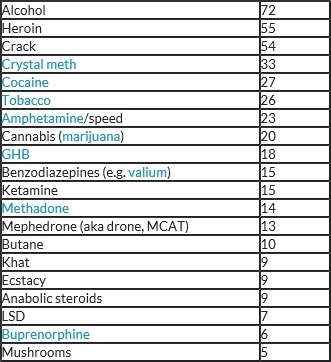Experts Say LSD Is Less Harmful Than Alcohol
By EV
A study came to our attention recently that claims psychedelics, including of course LSD, are not linked to mental health problems or suicidal behavior. Cool. There are studies for pretty much everything today though, so let’s take a further look into this claim.
The study was brought to attention in a report at Minds.com, along with an entry on suicidal behavior and alcohol abuse from the US national Library of Medicine (which for the record, is a US federal government agency—you’ll understand why this admission is valid in a moment). Unlike LSD, alcohol can lead to suicide not only because of impaired judgement, but through disinhibition and increased impulsiveness. It can also be used as a means of easing the distress associated with committing an act of suicide.
Minds.com’s report was ultimately meant to show how alcohol is actually more harmful than LSD, and we’re inclined to agree with this, but in order to understand why we’ll need to delve further into the study itself.
[do_widget id=text-16]
Conducted by the Research Council of Norway, the study took place among roughly 130,000 randomly selected adult citizens in the US. Of those citizens, a little over 19,000 had used LSD (lysergic acid diethylamide), psilocybin, or mescalin. This is actually a good number to work with. All too often it has been found that studies which were reported as fact are actually utter nonsense; many are conducted on only a couple dozen test-subjects (not nearly enough to represent all humans), they sometimes don’t even incorporate a control group, and they’re usually riddled with flaws.
Among those who had used LSD in the Research Council of Norway’s study, no links were found to “increased likelihood of past year serious psychological distress, mental health treatment, suicidal thoughts, suicidal plans and suicide attempt, depression and anxiety.” In conclusion, the study stated that “it is difficult to see how prohibition of psychedelics can be justified as a public health measure.”
READ: Study: LSD And Psilocybin Mushrooms Treat Roots Of Criminality
Let’s see if there are any other commonly-used sources that can provide support for the claims above:
Writer and researcher, Tim Locke, wrote a report for WebMD that included a scale of substances in terms of their overall harm. Locke’s report was based on a study conducted by Neuropharmacologist David Nutt, MD, of Imperial College London (which was ranked as the 2nd best university worldwide in 2015), and his research was reviewed and approved by Laura J. Martin, MD, MPH, a physician and educator with a rather impressive educational history of her own (source provided in her link).
The scale ranges from (0) to (100), (0) having no harmful effects, and (100) being the most harmful:
Alcohol tops the list as the most harmful substance with a score of 72, while LSD scored a mere 7 points. Locke’s report continues:
“Heroin, crack, and crystal meth were the most harmful drugs to the individual, while alcohol, heroin and crack were the most harmful to others. According to this ‘multicriteria decision analysis approach,’ alcohol is almost three times as harmful as cocaine or tobacco.”
Now let’s take a look at the inevitable anti-LSD study that refutes the studies above, claiming LSD is extremely harmful. Within seconds of doing a search, Drugs.com was at the top of the results with an entry claiming LSD users have an impaired ability to see common dangers, which makes them susceptible to personal injuries, and possibly even death. The report goes on to say that users may suffer from acute anxiety or depression afterwards, and can also develop long-lasting psychoses, such as schizophrenia or severe depression. This is literally the opposite conclusion those at WebMD came to.
While Drugs.com’s report provides two sources—both of which are from federal-government research groups—and a reviewer by the name of Leigh Ann Anderson who is an editorial pharmacist with a fair background, it does not provide an author. So, in digging deeper into Drugs.com’s information-sources, we found that a large majority of them are either US government agencies, or major corporations.
When it comes to legal representation, corporations like to be treated the same as individuals. Corporations are of course, not individuals, however thanks to something called “corporate personhood,” a form of legal fiction, or “the law’s ability to decree that something that’s not necessarily true is true,” (source), this is often how they are treated.
If individuals had the records corporations had, they’d be locked in a prison somewhere, forget getting a job or applying for a loan, and there’s no way we’d accept information derived from individuals with long histories of corruption. Let’s take a closer look at one of drug.com’s corporate-sources:
Cerner Multum was one of the first listed under drugs.com’s  licensing agreements. Cerner had a revenue of $3.402 billion in 2014, and bought Siemens AG that same year.
licensing agreements. Cerner had a revenue of $3.402 billion in 2014, and bought Siemens AG that same year.
Siemens AG—why does that name seem familiar… Oh that’s right, they’re the ones who, along with the Halliburton Company, are involved in a bribery scandal in which they’ve been accused of paying bribes to prominent Nigerians and former military Heads of State to award them with multi-million dollar contracts. In looking a bit further into their history, Siemens also exploited labor from victims in German concentration camps during WWII, and even owned a plant in Auschwitz (Hannah, 1964, p. 163). History aside though, this is a corporation with a multitude of business ties, ventures, and government contracts around the world, and they had a revenue of €75.63 billion in 2015 alone.
In related News: LSD May Help Treat Alcoholism
We could go back and forth for hours on studies that deny LSD is harmful, as well as those who refute them, and after digging into the sources for those studies, the results will most likely be the same; independent researchers claim LSD has extremely minor harmful effects, while government and corporate researchers state the opposite.
As usual, we don’t expect you to take our word for it—we encourage our readers to do the research for themselves, but for the Anons out there who have experimented with LSD (or even other forms of psychedelics) and who have also experienced living with an alcoholic family member; ask yourself which substance did the most harm and form your own opinion because technically, you’re an expert on the matter.
This Article (Experts Say LSD Is Less Harmful Than Alcohol) is a free and open source. You have permission to republish this article under a Creative Commons license with attribution to the author and AnonHQ.com. Image: wondergressive.com
Sources: Arendt, Hannah (1964). Eichmann in Jerusalem. Ein Bericht von der Banalität des Bösen. München.





